Advanced Strategic Marketing: Customer Experience and Loyalty
VerifiedAdded on 2022/08/18
|7
|1658
|12
Report
AI Summary
This report delves into the significant impact of customer experience on customer loyalty, trust, and commitment within a marketing context. It examines how organizations enhance customer experience through improved value propositions to retain customer commitment and increase sales volume. The report discusses factors influencing customer experience, such as proposition quality, value, cost, and support services, as well as the role of technological advancements and ethical considerations in research. Furthermore, it addresses the importance of research design, defining research problems, and research ethics, including voluntary participation, informed consent, and anonymity. The report also covers the strategic implications of market research, including exploratory, descriptive, and causal studies, and outlines the process of defining research problems and writing research briefs. The analysis also includes the impact of marketing strategies and the importance of customer perception in building loyalty. The report concludes by emphasizing the steady impact of customer experience on consumer behavior and discusses paradoxical situations in homogenous market structures, all of which are crucial for marketing professionals and students.
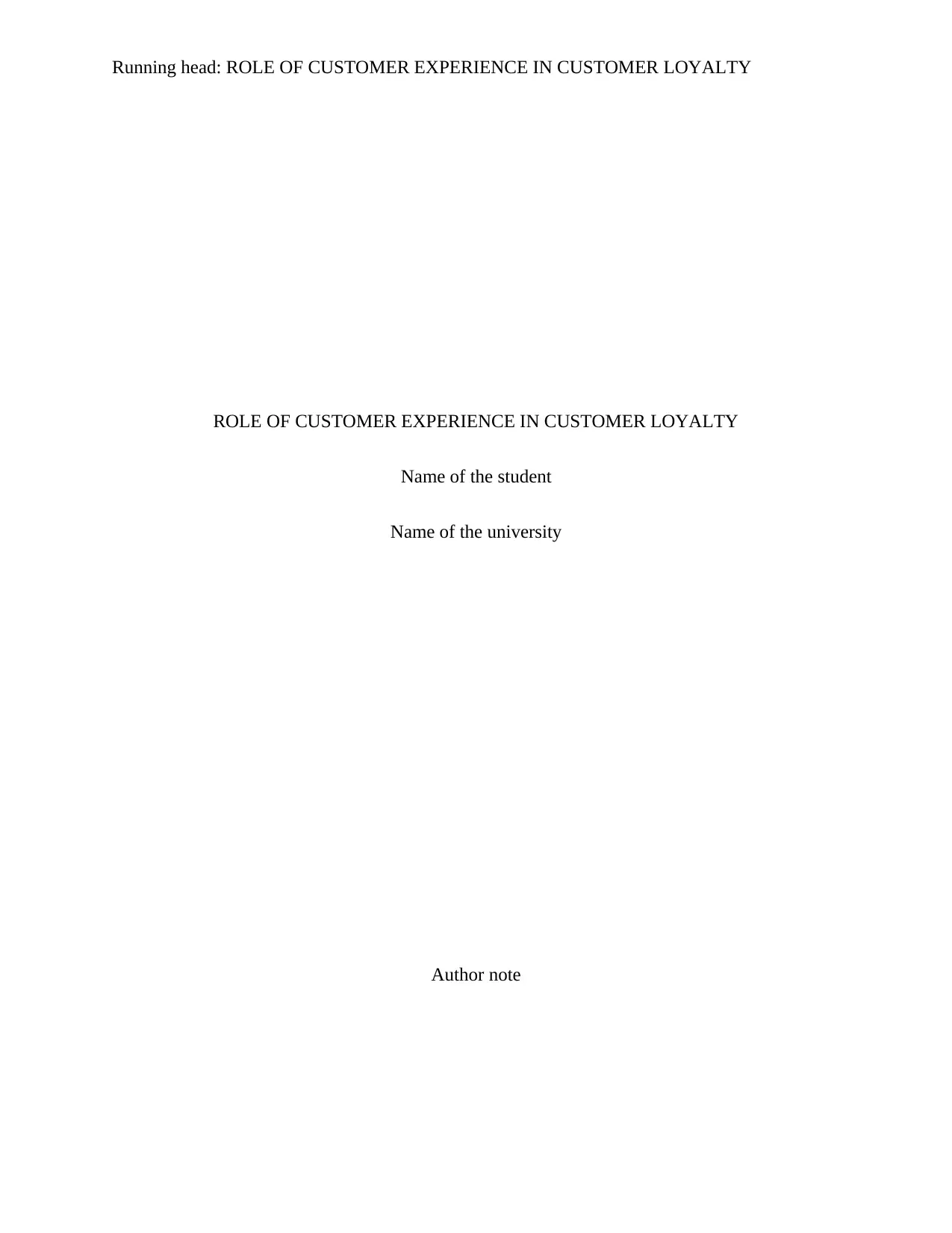
Running head: ROLE OF CUSTOMER EXPERIENCE IN CUSTOMER LOYALTY
ROLE OF CUSTOMER EXPERIENCE IN CUSTOMER LOYALTY
Name of the student
Name of the university
Author note
ROLE OF CUSTOMER EXPERIENCE IN CUSTOMER LOYALTY
Name of the student
Name of the university
Author note
Paraphrase This Document
Need a fresh take? Get an instant paraphrase of this document with our AI Paraphraser
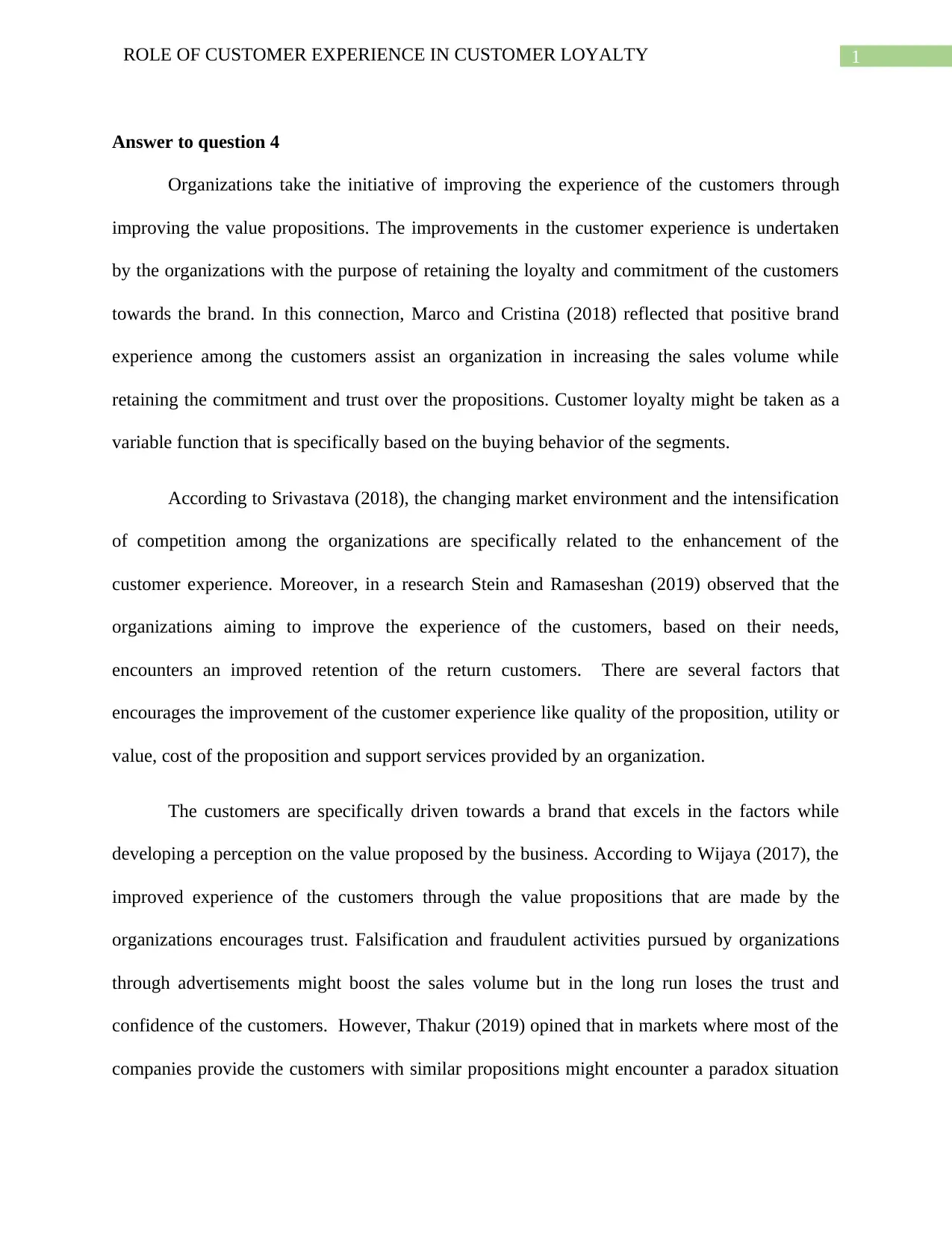
1ROLE OF CUSTOMER EXPERIENCE IN CUSTOMER LOYALTY
Answer to question 4
Organizations take the initiative of improving the experience of the customers through
improving the value propositions. The improvements in the customer experience is undertaken
by the organizations with the purpose of retaining the loyalty and commitment of the customers
towards the brand. In this connection, Marco and Cristina (2018) reflected that positive brand
experience among the customers assist an organization in increasing the sales volume while
retaining the commitment and trust over the propositions. Customer loyalty might be taken as a
variable function that is specifically based on the buying behavior of the segments.
According to Srivastava (2018), the changing market environment and the intensification
of competition among the organizations are specifically related to the enhancement of the
customer experience. Moreover, in a research Stein and Ramaseshan (2019) observed that the
organizations aiming to improve the experience of the customers, based on their needs,
encounters an improved retention of the return customers. There are several factors that
encourages the improvement of the customer experience like quality of the proposition, utility or
value, cost of the proposition and support services provided by an organization.
The customers are specifically driven towards a brand that excels in the factors while
developing a perception on the value proposed by the business. According to Wijaya (2017), the
improved experience of the customers through the value propositions that are made by the
organizations encourages trust. Falsification and fraudulent activities pursued by organizations
through advertisements might boost the sales volume but in the long run loses the trust and
confidence of the customers. However, Thakur (2019) opined that in markets where most of the
companies provide the customers with similar propositions might encounter a paradox situation
Answer to question 4
Organizations take the initiative of improving the experience of the customers through
improving the value propositions. The improvements in the customer experience is undertaken
by the organizations with the purpose of retaining the loyalty and commitment of the customers
towards the brand. In this connection, Marco and Cristina (2018) reflected that positive brand
experience among the customers assist an organization in increasing the sales volume while
retaining the commitment and trust over the propositions. Customer loyalty might be taken as a
variable function that is specifically based on the buying behavior of the segments.
According to Srivastava (2018), the changing market environment and the intensification
of competition among the organizations are specifically related to the enhancement of the
customer experience. Moreover, in a research Stein and Ramaseshan (2019) observed that the
organizations aiming to improve the experience of the customers, based on their needs,
encounters an improved retention of the return customers. There are several factors that
encourages the improvement of the customer experience like quality of the proposition, utility or
value, cost of the proposition and support services provided by an organization.
The customers are specifically driven towards a brand that excels in the factors while
developing a perception on the value proposed by the business. According to Wijaya (2017), the
improved experience of the customers through the value propositions that are made by the
organizations encourages trust. Falsification and fraudulent activities pursued by organizations
through advertisements might boost the sales volume but in the long run loses the trust and
confidence of the customers. However, Thakur (2019) opined that in markets where most of the
companies provide the customers with similar propositions might encounter a paradox situation
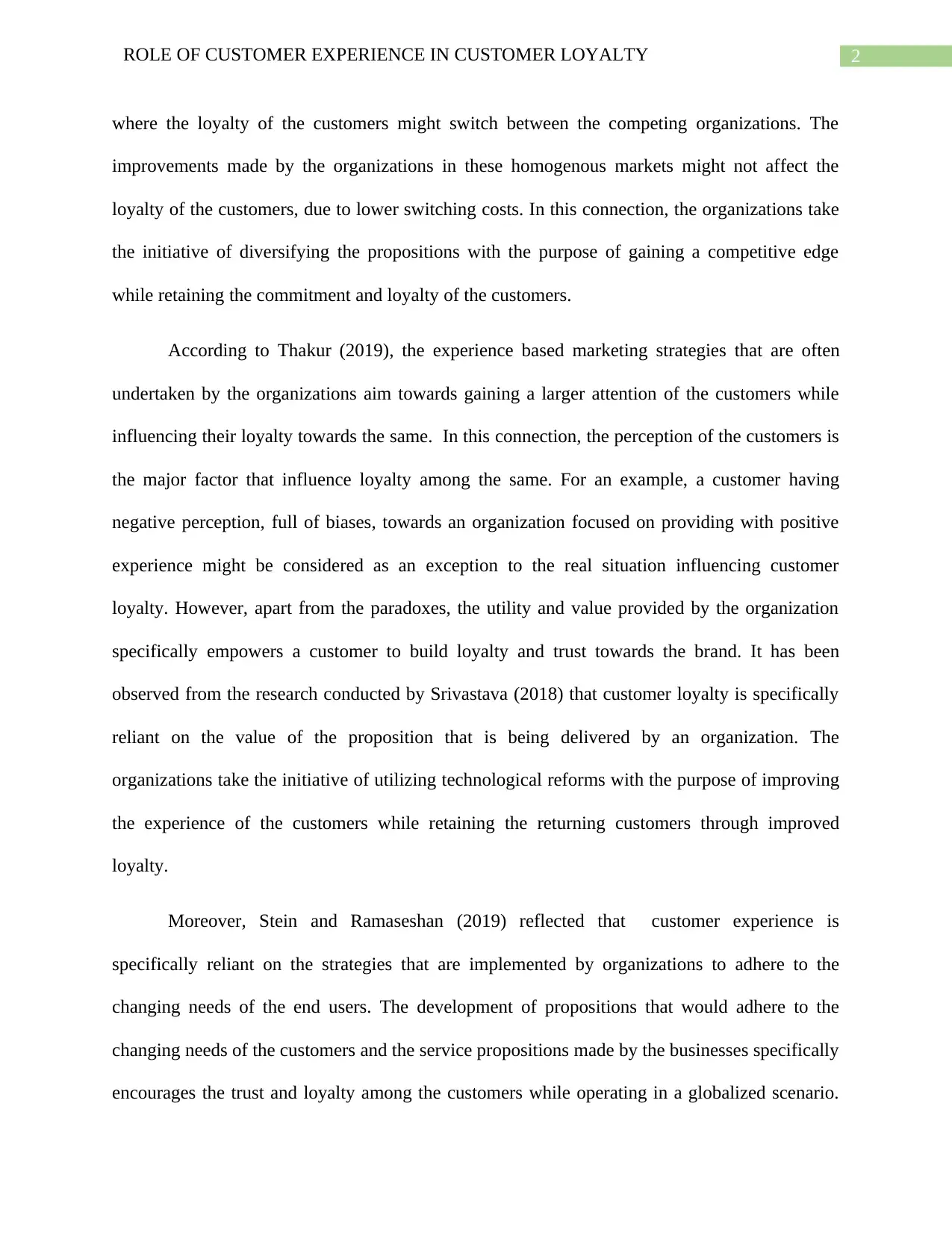
2ROLE OF CUSTOMER EXPERIENCE IN CUSTOMER LOYALTY
where the loyalty of the customers might switch between the competing organizations. The
improvements made by the organizations in these homogenous markets might not affect the
loyalty of the customers, due to lower switching costs. In this connection, the organizations take
the initiative of diversifying the propositions with the purpose of gaining a competitive edge
while retaining the commitment and loyalty of the customers.
According to Thakur (2019), the experience based marketing strategies that are often
undertaken by the organizations aim towards gaining a larger attention of the customers while
influencing their loyalty towards the same. In this connection, the perception of the customers is
the major factor that influence loyalty among the same. For an example, a customer having
negative perception, full of biases, towards an organization focused on providing with positive
experience might be considered as an exception to the real situation influencing customer
loyalty. However, apart from the paradoxes, the utility and value provided by the organization
specifically empowers a customer to build loyalty and trust towards the brand. It has been
observed from the research conducted by Srivastava (2018) that customer loyalty is specifically
reliant on the value of the proposition that is being delivered by an organization. The
organizations take the initiative of utilizing technological reforms with the purpose of improving
the experience of the customers while retaining the returning customers through improved
loyalty.
Moreover, Stein and Ramaseshan (2019) reflected that customer experience is
specifically reliant on the strategies that are implemented by organizations to adhere to the
changing needs of the end users. The development of propositions that would adhere to the
changing needs of the customers and the service propositions made by the businesses specifically
encourages the trust and loyalty among the customers while operating in a globalized scenario.
where the loyalty of the customers might switch between the competing organizations. The
improvements made by the organizations in these homogenous markets might not affect the
loyalty of the customers, due to lower switching costs. In this connection, the organizations take
the initiative of diversifying the propositions with the purpose of gaining a competitive edge
while retaining the commitment and loyalty of the customers.
According to Thakur (2019), the experience based marketing strategies that are often
undertaken by the organizations aim towards gaining a larger attention of the customers while
influencing their loyalty towards the same. In this connection, the perception of the customers is
the major factor that influence loyalty among the same. For an example, a customer having
negative perception, full of biases, towards an organization focused on providing with positive
experience might be considered as an exception to the real situation influencing customer
loyalty. However, apart from the paradoxes, the utility and value provided by the organization
specifically empowers a customer to build loyalty and trust towards the brand. It has been
observed from the research conducted by Srivastava (2018) that customer loyalty is specifically
reliant on the value of the proposition that is being delivered by an organization. The
organizations take the initiative of utilizing technological reforms with the purpose of improving
the experience of the customers while retaining the returning customers through improved
loyalty.
Moreover, Stein and Ramaseshan (2019) reflected that customer experience is
specifically reliant on the strategies that are implemented by organizations to adhere to the
changing needs of the end users. The development of propositions that would adhere to the
changing needs of the customers and the service propositions made by the businesses specifically
encourages the trust and loyalty among the customers while operating in a globalized scenario.
⊘ This is a preview!⊘
Do you want full access?
Subscribe today to unlock all pages.

Trusted by 1+ million students worldwide
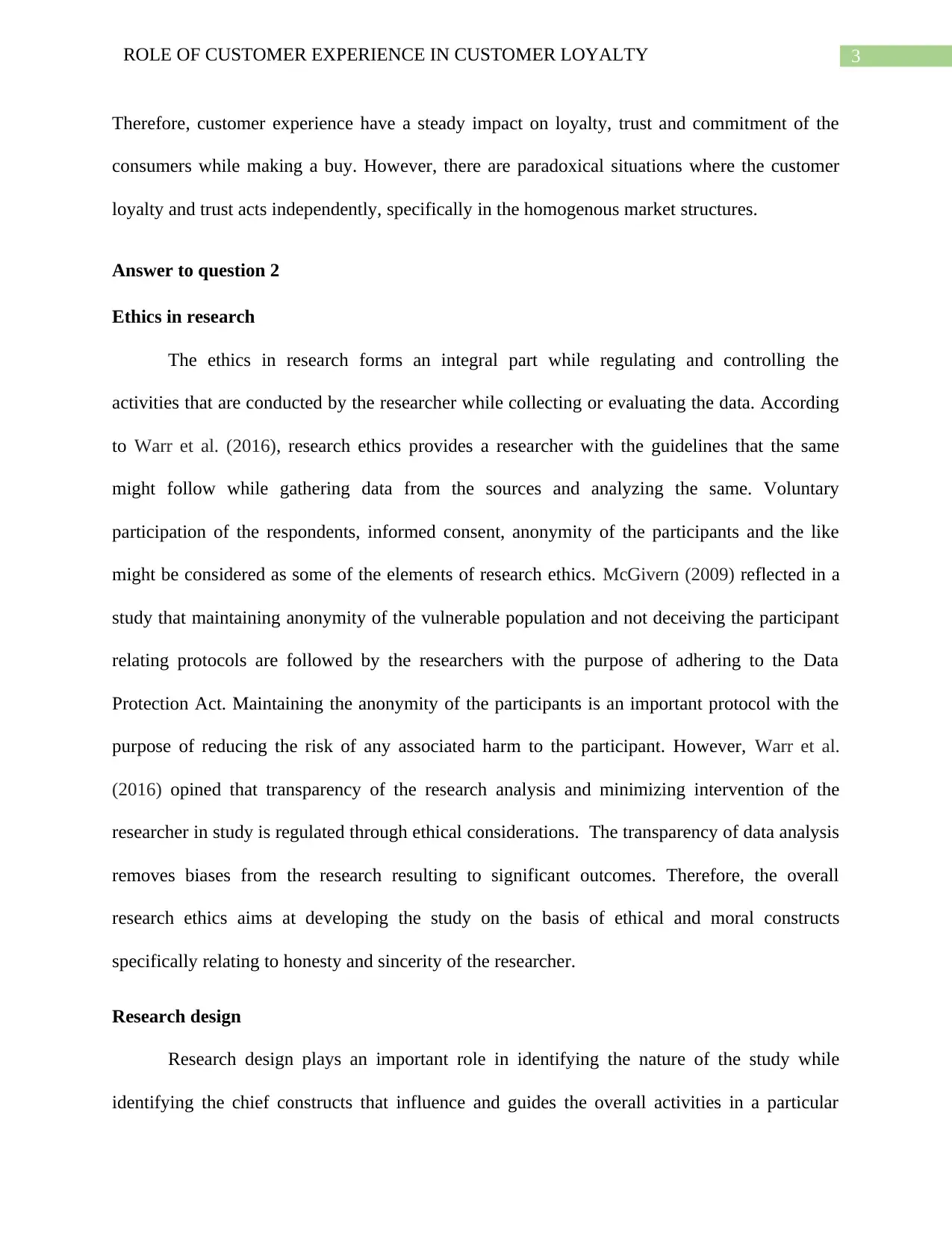
3ROLE OF CUSTOMER EXPERIENCE IN CUSTOMER LOYALTY
Therefore, customer experience have a steady impact on loyalty, trust and commitment of the
consumers while making a buy. However, there are paradoxical situations where the customer
loyalty and trust acts independently, specifically in the homogenous market structures.
Answer to question 2
Ethics in research
The ethics in research forms an integral part while regulating and controlling the
activities that are conducted by the researcher while collecting or evaluating the data. According
to Warr et al. (2016), research ethics provides a researcher with the guidelines that the same
might follow while gathering data from the sources and analyzing the same. Voluntary
participation of the respondents, informed consent, anonymity of the participants and the like
might be considered as some of the elements of research ethics. McGivern (2009) reflected in a
study that maintaining anonymity of the vulnerable population and not deceiving the participant
relating protocols are followed by the researchers with the purpose of adhering to the Data
Protection Act. Maintaining the anonymity of the participants is an important protocol with the
purpose of reducing the risk of any associated harm to the participant. However, Warr et al.
(2016) opined that transparency of the research analysis and minimizing intervention of the
researcher in study is regulated through ethical considerations. The transparency of data analysis
removes biases from the research resulting to significant outcomes. Therefore, the overall
research ethics aims at developing the study on the basis of ethical and moral constructs
specifically relating to honesty and sincerity of the researcher.
Research design
Research design plays an important role in identifying the nature of the study while
identifying the chief constructs that influence and guides the overall activities in a particular
Therefore, customer experience have a steady impact on loyalty, trust and commitment of the
consumers while making a buy. However, there are paradoxical situations where the customer
loyalty and trust acts independently, specifically in the homogenous market structures.
Answer to question 2
Ethics in research
The ethics in research forms an integral part while regulating and controlling the
activities that are conducted by the researcher while collecting or evaluating the data. According
to Warr et al. (2016), research ethics provides a researcher with the guidelines that the same
might follow while gathering data from the sources and analyzing the same. Voluntary
participation of the respondents, informed consent, anonymity of the participants and the like
might be considered as some of the elements of research ethics. McGivern (2009) reflected in a
study that maintaining anonymity of the vulnerable population and not deceiving the participant
relating protocols are followed by the researchers with the purpose of adhering to the Data
Protection Act. Maintaining the anonymity of the participants is an important protocol with the
purpose of reducing the risk of any associated harm to the participant. However, Warr et al.
(2016) opined that transparency of the research analysis and minimizing intervention of the
researcher in study is regulated through ethical considerations. The transparency of data analysis
removes biases from the research resulting to significant outcomes. Therefore, the overall
research ethics aims at developing the study on the basis of ethical and moral constructs
specifically relating to honesty and sincerity of the researcher.
Research design
Research design plays an important role in identifying the nature of the study while
identifying the chief constructs that influence and guides the overall activities in a particular
Paraphrase This Document
Need a fresh take? Get an instant paraphrase of this document with our AI Paraphraser
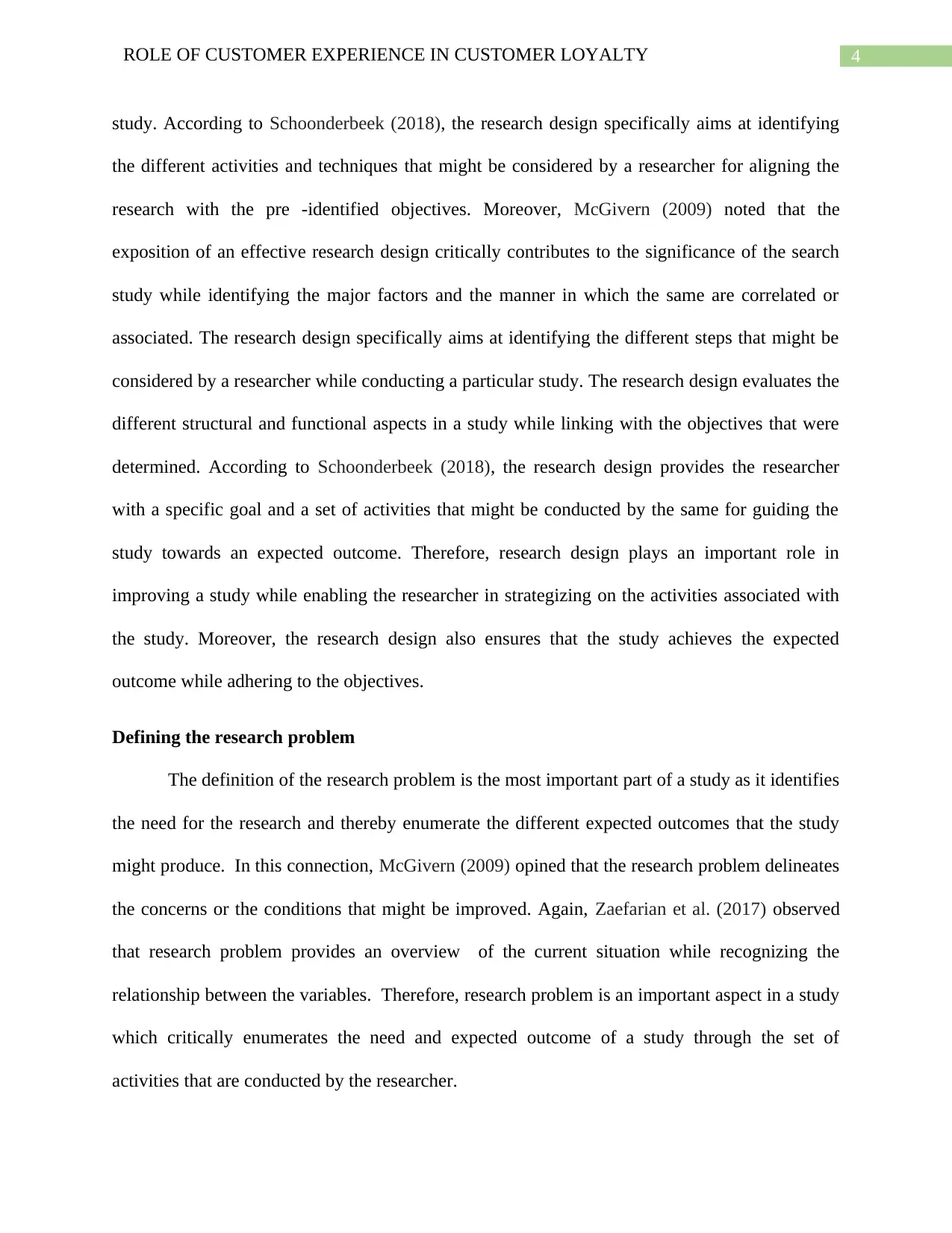
4ROLE OF CUSTOMER EXPERIENCE IN CUSTOMER LOYALTY
study. According to Schoonderbeek (2018), the research design specifically aims at identifying
the different activities and techniques that might be considered by a researcher for aligning the
research with the pre -identified objectives. Moreover, McGivern (2009) noted that the
exposition of an effective research design critically contributes to the significance of the search
study while identifying the major factors and the manner in which the same are correlated or
associated. The research design specifically aims at identifying the different steps that might be
considered by a researcher while conducting a particular study. The research design evaluates the
different structural and functional aspects in a study while linking with the objectives that were
determined. According to Schoonderbeek (2018), the research design provides the researcher
with a specific goal and a set of activities that might be conducted by the same for guiding the
study towards an expected outcome. Therefore, research design plays an important role in
improving a study while enabling the researcher in strategizing on the activities associated with
the study. Moreover, the research design also ensures that the study achieves the expected
outcome while adhering to the objectives.
Defining the research problem
The definition of the research problem is the most important part of a study as it identifies
the need for the research and thereby enumerate the different expected outcomes that the study
might produce. In this connection, McGivern (2009) opined that the research problem delineates
the concerns or the conditions that might be improved. Again, Zaefarian et al. (2017) observed
that research problem provides an overview of the current situation while recognizing the
relationship between the variables. Therefore, research problem is an important aspect in a study
which critically enumerates the need and expected outcome of a study through the set of
activities that are conducted by the researcher.
study. According to Schoonderbeek (2018), the research design specifically aims at identifying
the different activities and techniques that might be considered by a researcher for aligning the
research with the pre -identified objectives. Moreover, McGivern (2009) noted that the
exposition of an effective research design critically contributes to the significance of the search
study while identifying the major factors and the manner in which the same are correlated or
associated. The research design specifically aims at identifying the different steps that might be
considered by a researcher while conducting a particular study. The research design evaluates the
different structural and functional aspects in a study while linking with the objectives that were
determined. According to Schoonderbeek (2018), the research design provides the researcher
with a specific goal and a set of activities that might be conducted by the same for guiding the
study towards an expected outcome. Therefore, research design plays an important role in
improving a study while enabling the researcher in strategizing on the activities associated with
the study. Moreover, the research design also ensures that the study achieves the expected
outcome while adhering to the objectives.
Defining the research problem
The definition of the research problem is the most important part of a study as it identifies
the need for the research and thereby enumerate the different expected outcomes that the study
might produce. In this connection, McGivern (2009) opined that the research problem delineates
the concerns or the conditions that might be improved. Again, Zaefarian et al. (2017) observed
that research problem provides an overview of the current situation while recognizing the
relationship between the variables. Therefore, research problem is an important aspect in a study
which critically enumerates the need and expected outcome of a study through the set of
activities that are conducted by the researcher.
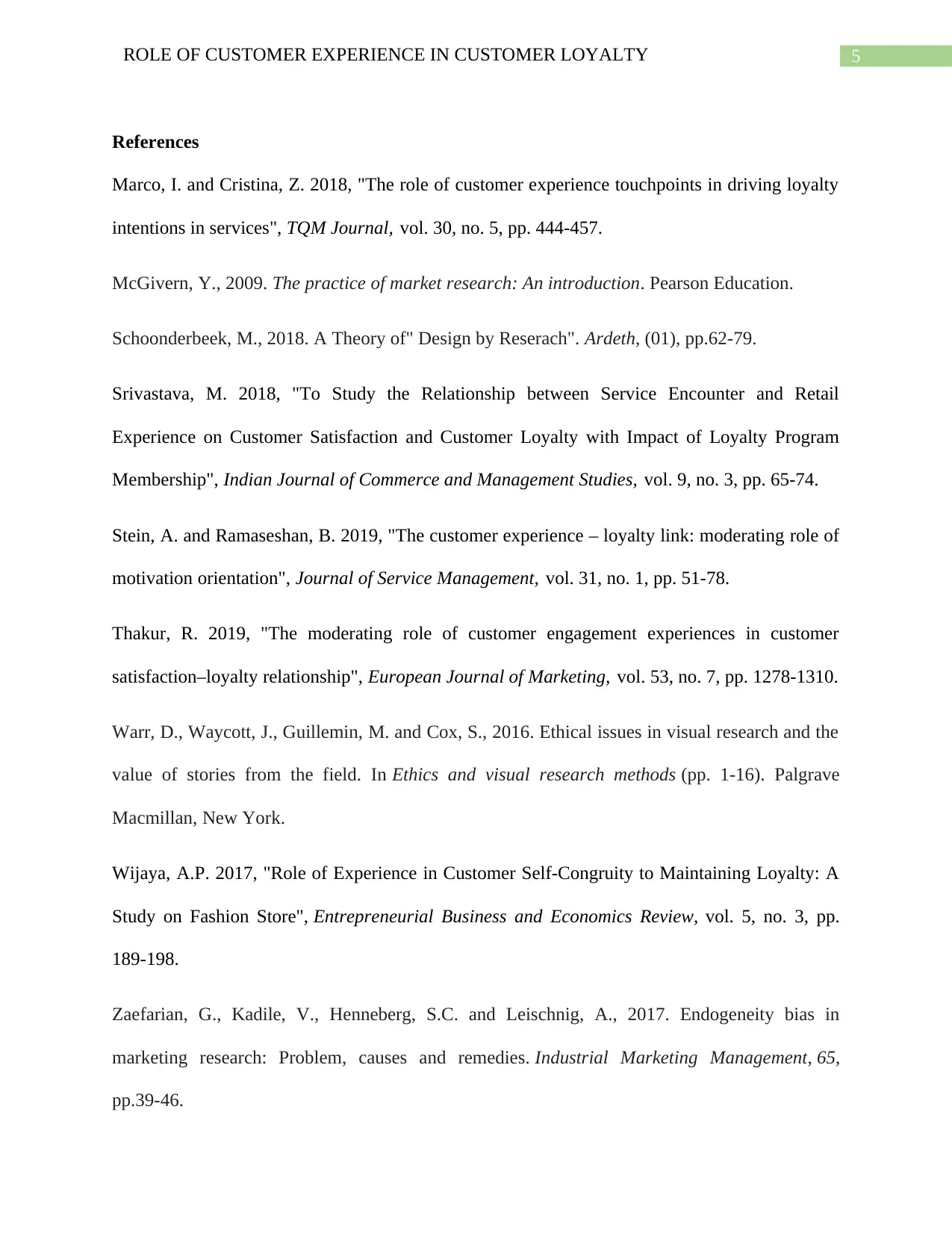
5ROLE OF CUSTOMER EXPERIENCE IN CUSTOMER LOYALTY
References
Marco, I. and Cristina, Z. 2018, "The role of customer experience touchpoints in driving loyalty
intentions in services", TQM Journal, vol. 30, no. 5, pp. 444-457.
McGivern, Y., 2009. The practice of market research: An introduction. Pearson Education.
Schoonderbeek, M., 2018. A Theory of" Design by Reserach". Ardeth, (01), pp.62-79.
Srivastava, M. 2018, "To Study the Relationship between Service Encounter and Retail
Experience on Customer Satisfaction and Customer Loyalty with Impact of Loyalty Program
Membership", Indian Journal of Commerce and Management Studies, vol. 9, no. 3, pp. 65-74.
Stein, A. and Ramaseshan, B. 2019, "The customer experience – loyalty link: moderating role of
motivation orientation", Journal of Service Management, vol. 31, no. 1, pp. 51-78.
Thakur, R. 2019, "The moderating role of customer engagement experiences in customer
satisfaction–loyalty relationship", European Journal of Marketing, vol. 53, no. 7, pp. 1278-1310.
Warr, D., Waycott, J., Guillemin, M. and Cox, S., 2016. Ethical issues in visual research and the
value of stories from the field. In Ethics and visual research methods (pp. 1-16). Palgrave
Macmillan, New York.
Wijaya, A.P. 2017, "Role of Experience in Customer Self-Congruity to Maintaining Loyalty: A
Study on Fashion Store", Entrepreneurial Business and Economics Review, vol. 5, no. 3, pp.
189-198.
Zaefarian, G., Kadile, V., Henneberg, S.C. and Leischnig, A., 2017. Endogeneity bias in
marketing research: Problem, causes and remedies. Industrial Marketing Management, 65,
pp.39-46.
References
Marco, I. and Cristina, Z. 2018, "The role of customer experience touchpoints in driving loyalty
intentions in services", TQM Journal, vol. 30, no. 5, pp. 444-457.
McGivern, Y., 2009. The practice of market research: An introduction. Pearson Education.
Schoonderbeek, M., 2018. A Theory of" Design by Reserach". Ardeth, (01), pp.62-79.
Srivastava, M. 2018, "To Study the Relationship between Service Encounter and Retail
Experience on Customer Satisfaction and Customer Loyalty with Impact of Loyalty Program
Membership", Indian Journal of Commerce and Management Studies, vol. 9, no. 3, pp. 65-74.
Stein, A. and Ramaseshan, B. 2019, "The customer experience – loyalty link: moderating role of
motivation orientation", Journal of Service Management, vol. 31, no. 1, pp. 51-78.
Thakur, R. 2019, "The moderating role of customer engagement experiences in customer
satisfaction–loyalty relationship", European Journal of Marketing, vol. 53, no. 7, pp. 1278-1310.
Warr, D., Waycott, J., Guillemin, M. and Cox, S., 2016. Ethical issues in visual research and the
value of stories from the field. In Ethics and visual research methods (pp. 1-16). Palgrave
Macmillan, New York.
Wijaya, A.P. 2017, "Role of Experience in Customer Self-Congruity to Maintaining Loyalty: A
Study on Fashion Store", Entrepreneurial Business and Economics Review, vol. 5, no. 3, pp.
189-198.
Zaefarian, G., Kadile, V., Henneberg, S.C. and Leischnig, A., 2017. Endogeneity bias in
marketing research: Problem, causes and remedies. Industrial Marketing Management, 65,
pp.39-46.
⊘ This is a preview!⊘
Do you want full access?
Subscribe today to unlock all pages.

Trusted by 1+ million students worldwide

6ROLE OF CUSTOMER EXPERIENCE IN CUSTOMER LOYALTY
1 out of 7
Related Documents
Your All-in-One AI-Powered Toolkit for Academic Success.
+13062052269
info@desklib.com
Available 24*7 on WhatsApp / Email
![[object Object]](/_next/static/media/star-bottom.7253800d.svg)
Unlock your academic potential
Copyright © 2020–2025 A2Z Services. All Rights Reserved. Developed and managed by ZUCOL.





